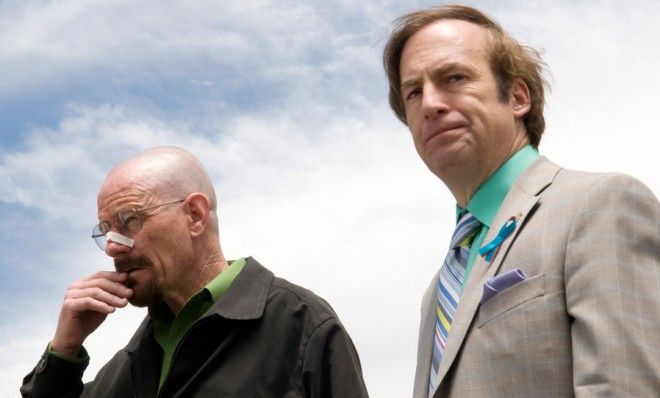12 of our favorite words from Breaking Bad
Banjo eyes, huckleberry, Franch, and more!


Just what does it mean to break bad? We discussed it in an earlier post: Breaking bad is American Southern colloquialism for "turn[ing] toward a life of crime or immoral activity," as well as, according to Partridge, "act[ing] in a threatening, menacing manner" — two counts, among many others, that Walter White and his band of not-so-merry thieves and drug dealers are guilty of. We're guilty of being addicted to this show, so we've cooked up a glossary of words that break bad. Spoilers follow.
1. banjo eyes
Banjo eyes are "wide-open eyes, as from being surprised or startled," similar in appearance to the round and white banjo body. The term seems to have originated in the early 1900s.
Subscribe to The Week
Escape your echo chamber. Get the facts behind the news, plus analysis from multiple perspectives.

Sign up for The Week's Free Newsletters
From our morning news briefing to a weekly Good News Newsletter, get the best of The Week delivered directly to your inbox.
From our morning news briefing to a weekly Good News Newsletter, get the best of The Week delivered directly to your inbox.
Example: Hank: "What about that Lydia what's-her-name? You know, Lady Banjo Eyes at the warehouse?"
— "Fifty-One," August 5, 2012
2. dark territory
Dark territory refers to "a section of [railroad] track not controlled by signals," in which "train movements in dark territory are controlled by track warrants or train order operation, with train dispatchers issuing orders by radio communication with train engineers."
Sign up for Today's Best Articles in your inbox
A free daily email with the biggest news stories of the day – and the best features from TheWeek.com
Example: Lydia: "If a freight train is stopped in transit anywhere other than the usual yards or depots, absolutely, a signal will automatically alarm the FRA and the TSA surface division of the department of Homeland Security. But what you don't know and I do because my job requires me to keep track of buyers' shipments — this is dark territory."
Jesse: "What's that?"
Lydia: "Transpeak for an area of no contact. It's a dead zone. No automated supervision system, no alarms, no contact with control. No cellular either. I'm telling you, it's the perfect place."
— "Dead Freight," August 12, 2012
3. dead drop
A dead drop is "a location used to secretly pass items between two people, without requiring them to meet."
Example: Steven [watching Mike]: "It's a dead drop. He just stashed something underneath that trash can."
— "Buyout," August 19, 2012
4. ex parte
A temporary restraining order that is filed ex parte is filed "without informing in advance the party to whom the TRO is directed," and is usually done so "to prevent an adversary from having notice of one's intentions." The definition of ex parte in law is "proceeding from or concerned with only one part or side of a matter in question: with reference to any step taken by or on behalf of one of the parties to a suit or in any judicial proceeding without notice to the other."
Example: Saul: "I have filed for a temporary restraining order against the DEA on behalf of Mr. Ehrmantraut... Expect a visit from the sheriff, agents. You should have your ex parte within the hour."
— "Buyout," August 19, 2012
5. flip
To flip in this context means "to cause (a person) to turn against former colleagues, such as to become a witness for the state, in a criminal prosecution in which the person is a defendant."
Example: Saul: "If the DEA catches him and he flips, it's good night, John Boy."
Jesse: "Mike won't flip."
— "Say My Name," August 26, 2012
6. Franch
Franch is a type of salad dressing or sauce that's a blend, literally and linguistically, of French and ranch dressing.
Example: Food scientist: "This one is a new concept, and it intrigues us, half-French dressing, half-ranch. We refer to it simply as 'Franch.'"
— "Madrigal," July 22, 2012
7. huckleberry
The phrase I'm your huckleberry means "to be just the right person for a given job, or a willing executor of some commission," says World Wide Words. The phrase comes from the idea of huckleberries being "small, dark and rather insignificant," and the sense that "the man for the job isn't obvious." It doesn't seem to derive directly from Mark Twain's Huckleberry Finn.
Example: Saul: "Do I complain? No, beg, borrow, or steal, I'm your huckleberry. I go the extra mile."
— "Live Free or Die," July 15, 2012
8. in Dutch
To be in Dutch means to be "in trouble or disfavor" with, and perhaps comes from the old stereotype, says World Wide Words, of the Dutch being "stolid, miserly, and bad-tempered." Other Dutch phrases include go Dutch, Dutch treat, Dutch courage, and Dutch uncle.
Example: Saul: "She's been cooking Beneke's books. He's in Dutch with the IRS, and once they audit, it's Rio de Caca for the both of them, to which I say, 'Hey, let's involve Walt in this discussion,' to which she says, 'No.'"
— "Live Free or Die," July 15, 2012
9. mule
A mule is slang for "a person who serves as a courier of illegal drugs." It comes from the idea of the mule as a pack animal, "used to carry loads," and is first attested to 1935.
Example: Mike: "You're forgetting about the mules. They get a flat 20 percent."
Walt: "The what?"
Jesse: "The drivers that are the ones that take the product from us to the dealers."
— "Hazard Pay," July 29, 2012
10. queen for a day
Queen for a day agreements, according to the New York Criminal Bar Association, are also known as proffer agreements. They "govern the conditions under which prospective criminal defendants and the government agree to conduct an interview," and "generally require criminal defendants, who hope to gain leniency through a reduced sentence or immunity grant, to waive their plea-statement rights, and they permit, in certain circumstances, the prosecution to introduce previously inadmissible proffer statements at trial." The term comes from the television show of the same name.
Example: Lawyer: "The best I'd be willing to do is queen for a day and reduced charges."
Hank: "He could be a fairy princess for all I care."
— "Gliding Over All," September 2, 2012
11. second-story man
A second-story man is slang for "a burglar adept at entering through upstairs windows." A B&E artist is adept at breaking and entering, which is "the gaining of unauthorized, illegal access to another's premises, as by forcing a lock."
Example: Saul: "Pest control operation's legit. They're licensed, they're bonded, they do as good a job as anyone in town. But they're also top-drawer second-story men.
Walt: "Second story?"
Saul: "B&E artists. They're burglars."
— "Hazard Pay," July 29, 2012
12. special sauce
Special sauce originally referred to McDonald's "basic ingredient in [their] Big Mac hamburgers, a sort of Thousand Island dressing (now called Big Mac sauce by the company)," but now perhaps refers to any unidentifiable fast food sauce. For more on special sauces, checkout Erin McKean's article on saucy affixes.
Example: Hank [to Mike]: "Corporate security. What's that, like guarding the special sauce?"
— "Madrigal," July 22, 2012
More from Wordnik...
-
 A Real Pain: Kieran Culkin and Jesse Eisenberg star in 'uproariously funny' drama
A Real Pain: Kieran Culkin and Jesse Eisenberg star in 'uproariously funny' dramaThe Week Recommends The film, dubbed an heir of Woody Allen, follows Jewish American cousins who travel to Poland in memory of their late grandmother
By The Week UK Published
-
 Titaníque: 'outrageous' Céline Dion parody is a lot of fun
Titaníque: 'outrageous' Céline Dion parody is a lot of funThe Week Recommends 'Frothy' musical spoof of the blockbuster film with 'sparkling' performances
By The Week UK Published
-
 Collared by Chris Pearson: a 'fascinating' history of dogs
Collared by Chris Pearson: a 'fascinating' history of dogsThe Week Recommends 'Useful' and informative book examines our changing relationship with canines
By The Week UK Published